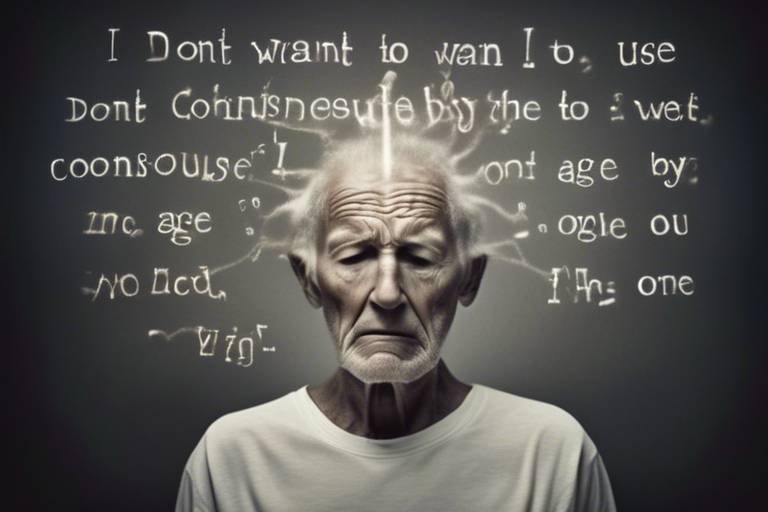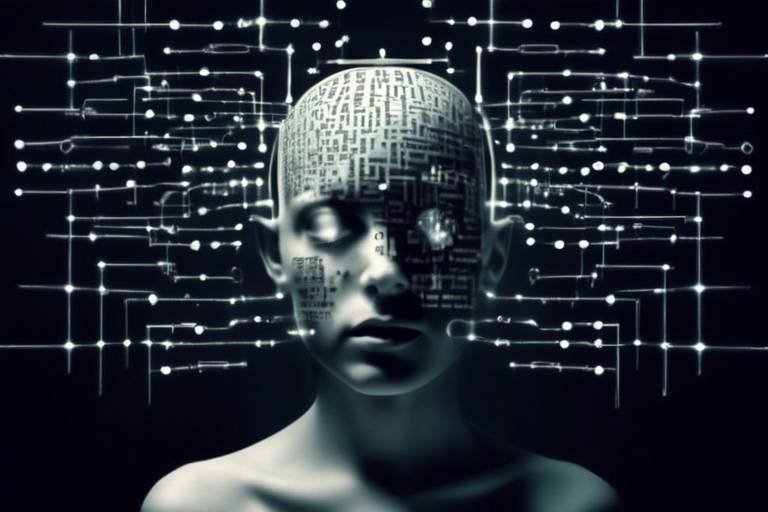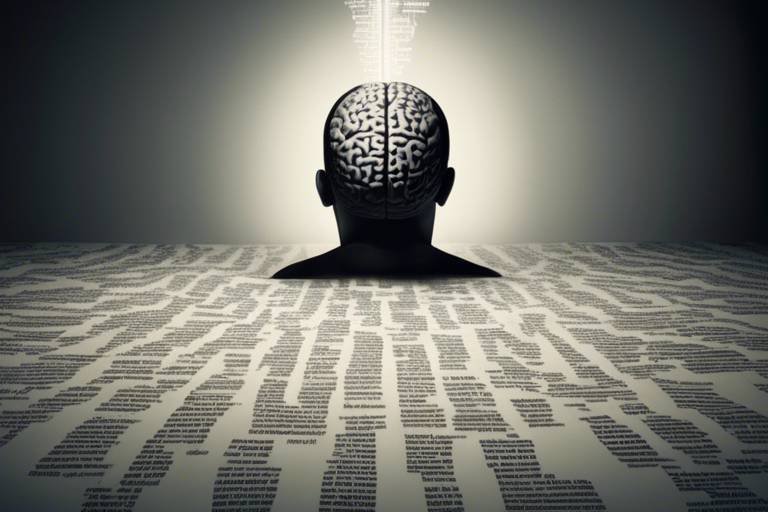How is Consciousness Affected By Age?
As we journey through life, the concept of consciousness evolves, intertwining with our experiences and the passage of time. Have you ever wondered how your awareness of the world around you changes as you age? This article delves deep into the fascinating relationship between consciousness and aging, exploring how cognitive functions, self-awareness, and perceptual abilities evolve over the years. The implications of these changes are profound, affecting not only individuals but also society as a whole.
To understand how consciousness is affected by age, we must first grasp what consciousness truly is. It’s more than just being awake; it encompasses our thoughts, perceptions, emotions, and self-awareness. Various theories attempt to define consciousness, ranging from philosophical perspectives to neuroscientific explanations. Some view it as a continuous stream of experiences, while others see it as a collection of discrete moments. The complexity of consciousness is influenced by numerous factors throughout life, including genetics, environment, and personal experiences.
As we age, many individuals experience a decline in cognitive functions. This is often a natural part of the aging process, leading to challenges such as memory loss, slower processing speeds, and diminished problem-solving abilities. Imagine trying to recall a friend's name or struggling to follow a conversation; these instances can be frustrating and may impact daily life significantly. Cognitive decline can lead to feelings of helplessness, but understanding these changes can help us navigate them more effectively.
Several factors contribute to cognitive decline in older adults. These include:
- Genetics: Family history plays a crucial role in determining cognitive health.
- Lifestyle Choices: Diet, exercise, and mental engagement can significantly influence cognitive longevity.
- Environmental Influences: Social interactions and exposure to stimulating environments can either hinder or enhance cognitive function.
Understanding these factors can empower individuals to make informed choices to maintain their cognitive health as they age.
Neuroplasticity refers to the brain's remarkable ability to reorganize itself by forming new neural connections throughout life. This adaptability is crucial in understanding consciousness in aging. Even as cognitive functions decline, neuroplasticity can help mitigate these effects, promoting mental agility in older adults. By engaging in activities that challenge the brain, such as learning new skills or solving puzzles, older individuals can enhance their cognitive resilience and maintain a vibrant consciousness.
Maintaining cognitive health as we age is essential for preserving consciousness and overall quality of life. Here are some effective strategies:
- Physical Exercise: Regular physical activity boosts blood flow to the brain and enhances cognitive function.
- Mental Stimulation: Engaging in puzzles, reading, or learning new skills can keep the brain active.
- Social Engagement: Staying connected with friends and family fosters emotional well-being and cognitive health.
Implementing these strategies can make a significant difference in how we experience consciousness as we age.
Self-awareness is a vital component of consciousness that evolves with age. As we grow older, our self-perception often shifts, influenced by life experiences and societal changes. This evolution can impact mental health and identity, creating a complex relationship with our sense of self. For instance, older adults may reflect on their life achievements and challenges, leading to a deeper understanding of themselves, which can enhance their overall sense of consciousness.
Aging significantly alters perception, affecting how individuals interpret sensory information. Changes in sensory processing can lead to a different experience of consciousness. For example, an older adult may find it difficult to hear a conversation in a noisy environment, which can lead to feelings of isolation. Understanding these changes is crucial for fostering better communication and connection in social settings.
Visual and auditory capabilities often decline with age, impacting an individual's consciousness. These sensory changes can influence awareness and engagement with the world around them. Imagine trying to appreciate a beautiful sunset but struggling to see its vibrant colors; this can lead to a disconnect from one’s environment. Recognizing these changes can help individuals adapt and find new ways to engage with their surroundings.
As people age, emotional and social perception can also shift. Older adults may develop a heightened sense of empathy and emotional awareness, allowing them to navigate interpersonal relationships more effectively. However, they may also face challenges in social interactions due to cognitive decline. This duality can create a rich tapestry of experiences, shaping their overall consciousness and how they relate to others.
Q: Does everyone experience cognitive decline as they age?
A: While many individuals may face some cognitive challenges, the extent varies greatly among individuals. Factors such as genetics, lifestyle, and engagement play significant roles.
Q: Can cognitive decline be reversed?
A: While some cognitive decline is natural, engaging in mental and physical activities can help mitigate its effects and promote brain health.
Q: How can I support a loved one experiencing cognitive decline?
A: Encouraging social interactions, providing mental stimulation, and maintaining a routine can significantly help those facing cognitive challenges.

The Nature of Consciousness
Understanding consciousness is fundamental to exploring its changes with age. At its core, consciousness can be described as the state of being aware of and able to think about one's own existence, thoughts, and surroundings. It's like the spotlight of your mind, illuminating your experiences and perceptions. However, this spotlight can dim or flicker as we age, leading us to question: how does this affect our daily lives?
Various theories attempt to define consciousness, each offering a unique perspective. Some suggest it's a product of brain activity, while others argue it stems from a deeper, more spiritual essence. For example, the biological perspective emphasizes the role of neural connections, while the philosophical standpoint delves into the subjective experience of being. These differing viewpoints highlight the complexity of consciousness, making it a fascinating subject of study across disciplines.
As we navigate through life, consciousness is influenced by a multitude of factors, including genetics, environment, and personal experiences. Just like a garden, where the type of soil, sunlight, and water determine the growth of plants, our consciousness is shaped by the interplay of these elements. Throughout our lives, we gather experiences that enrich this garden, but as we age, some of these factors can lead to a decline in our cognitive functions.
It's essential to recognize that the evolution of consciousness isn't merely a decline; it can also be a transformation. Many older adults report a shift in their awareness, often gaining a deeper understanding of themselves and their place in the world. This newfound perspective can lead to greater emotional resilience and a more profound appreciation for life. However, it also raises questions about how we can support this evolution in a society that often prioritizes youth.
In summary, consciousness is a multi-faceted phenomenon that evolves over time. It encompasses our awareness, thoughts, and perceptions, all influenced by a variety of internal and external factors. As we age, understanding these changes becomes crucial, not only for individual well-being but also for fostering a society that values the insights and experiences of its older members.

Cognitive Decline in Aging
The journey of aging is a fascinating yet complex process, particularly when it comes to our cognitive functions. As we age, many of us may notice a gradual decline in our mental faculties. This decline is not just a simple matter of forgetting where we placed our keys; it encompasses a range of cognitive challenges that can significantly affect our daily lives. Think of it as a computer that starts to slow down as it accumulates more programs and files over the years. Just like that computer, our brains can become less efficient, leading to issues such as memory loss, slower processing speeds, and diminished problem-solving abilities.
Memory loss is perhaps the most recognized aspect of cognitive decline. While it’s normal to occasionally forget names or appointments, more significant memory issues can emerge with age. This can manifest as difficulty recalling recent events or conversations, which can be frustrating and disheartening. Imagine trying to tell a story but stumbling over the details; this can be the reality for many older adults. Additionally, processing speed tends to slow down, making it challenging to keep up with conversations or react quickly in social situations. It’s like trying to run a race in slow motion while everyone else is sprinting ahead.
Moreover, problem-solving abilities can also decline, making it tougher to navigate everyday tasks that once seemed simple. This can lead to feelings of inadequacy or frustration, as many older adults find themselves relying on others for assistance with tasks they previously managed independently. The implications of these cognitive challenges extend beyond individual experiences; they can affect family dynamics, social interactions, and overall quality of life. However, it’s important to remember that while cognitive decline is a common aspect of aging, it's not an inevitable fate for everyone. With the right strategies and support, many individuals can maintain their cognitive health well into their later years.
To better illustrate the impact of cognitive decline, consider the following table that summarizes some common cognitive challenges faced by the elderly:
| Cognitive Challenge | Description |
|---|---|
| Memory Loss | Difficulty recalling recent events or information. |
| Slower Processing Speed | Taking longer to understand or respond to information. |
| Diminished Problem-Solving Abilities | Struggling with tasks that require critical thinking or planning. |
In conclusion, while cognitive decline can be a challenging aspect of aging, understanding these changes can empower individuals and their families to seek solutions and support. By recognizing the signs and taking proactive steps, it’s possible to enhance cognitive health and maintain a fulfilling life as one ages.
- What are the early signs of cognitive decline? Early signs may include forgetfulness, difficulty concentrating, or trouble following conversations.
- Can cognitive decline be prevented? While some decline is natural, engaging in regular mental exercises, physical activity, and maintaining social connections can help mitigate its effects.
- Is memory loss a normal part of aging? Some memory loss is common, but significant memory issues may indicate conditions like dementia and should be discussed with a healthcare professional.

Cognitive decline in older adults is a multifaceted issue influenced by a variety of factors. Understanding these elements is crucial for developing effective strategies to maintain cognitive health as we age. One of the primary contributors to cognitive decline is genetics. Research suggests that individuals with a family history of dementia or other cognitive impairments may be at a higher risk themselves. This genetic predisposition can set the stage for various cognitive challenges later in life, making awareness of family health history essential.
However, genetics is not the only player in this complex game. Lifestyle choices also hold significant sway over cognitive health. Factors such as diet, exercise, and social engagement can either bolster or hinder cognitive function. For instance, a diet rich in antioxidants, omega-3 fatty acids, and vitamins can support brain health, while a sedentary lifestyle may accelerate cognitive decline. Engaging in regular physical activity not only promotes overall well-being but also enhances neuroplasticity—the brain's ability to adapt and reorganize itself—which is vital for maintaining cognitive function.
Moreover, environmental influences play an essential role in shaping cognitive outcomes. The environments in which individuals live and work can either stimulate or stifle cognitive engagement. For example, individuals living in vibrant communities with access to educational resources, social activities, and mental challenges tend to maintain better cognitive function compared to those in isolated or less stimulating settings. It's like the difference between a garden that receives plenty of sunlight and water versus one that is neglected and left to wither. The right environment can nurture cognitive abilities, while a lack of stimulation can lead to decline.
Additionally, psychological factors such as stress and mental health have a profound impact on cognitive decline. Chronic stress can lead to inflammation and other physiological changes that may impair cognitive function. Furthermore, conditions like depression and anxiety can cloud cognitive processes, making it difficult for individuals to think clearly or remember important information. Addressing these mental health issues is crucial not only for emotional well-being but also for preserving cognitive abilities.
In summary, cognitive decline in aging is influenced by a combination of genetic, lifestyle, environmental, and psychological factors. By understanding these influences, individuals can take proactive steps to mitigate cognitive decline and enhance their quality of life as they age. It’s a bit like piecing together a puzzle: each factor plays its part in the larger picture of cognitive health.
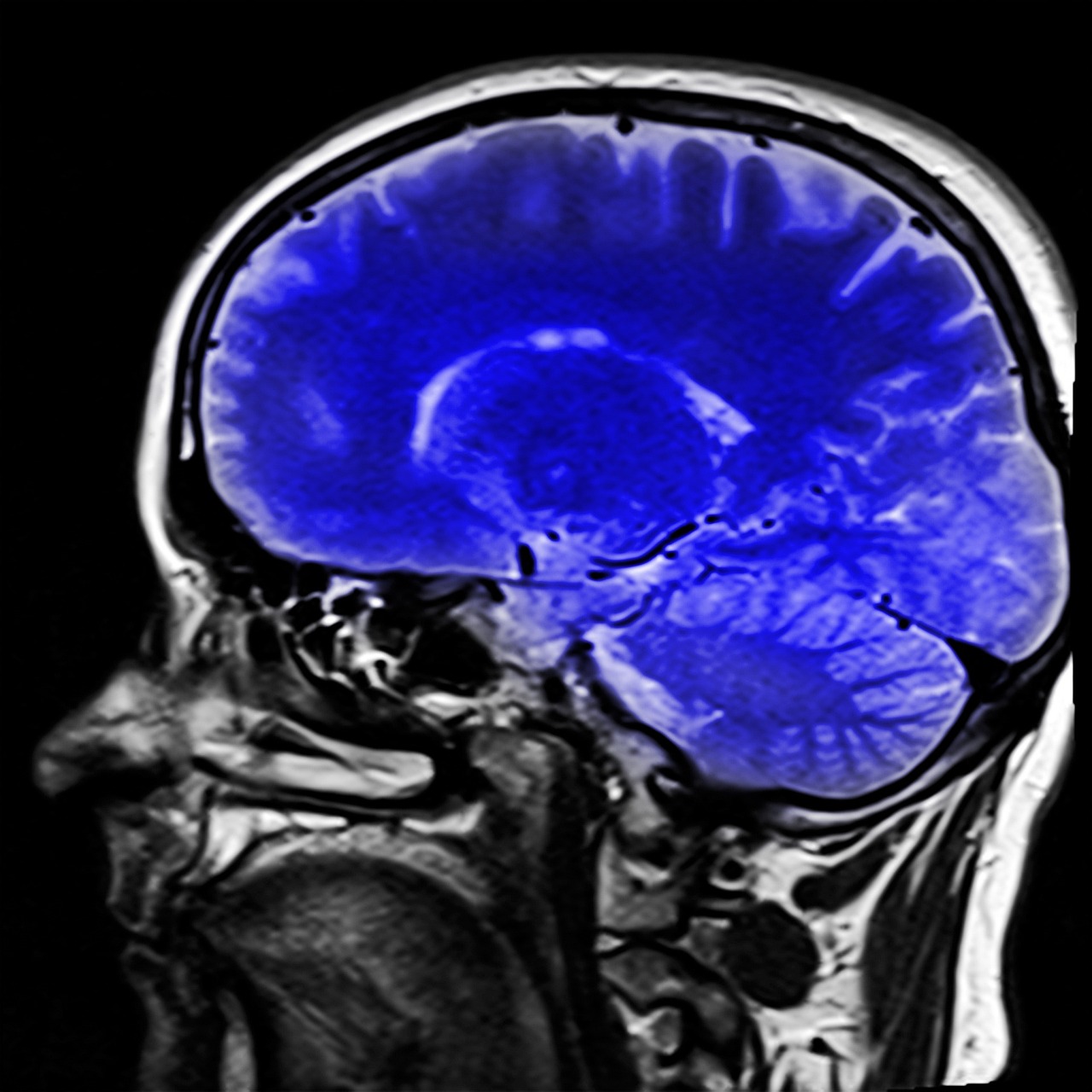
Neuroplasticity, often referred to as the brain's remarkable ability to adapt and reorganize itself, plays a pivotal role in understanding how consciousness evolves with age. While many people associate aging with a decline in cognitive function, the truth is that neuroplasticity offers a glimmer of hope. It allows the brain to forge new connections, adapt to changes, and even recover from injuries. This adaptability is essential for maintaining cognitive health as we grow older.
As we age, our brains undergo various structural and functional changes. However, neuroplasticity can mitigate some of these effects. For instance, engaging in new activities—be it learning a new language, picking up a musical instrument, or even solving puzzles—can stimulate brain activity and foster the creation of new neural pathways. This is crucial because it helps to counteract the natural cognitive decline that can accompany aging.
Research has shown that the brain retains a degree of plasticity throughout our lives, which means that older adults can still learn and adapt. This is particularly important for maintaining self-awareness and cognitive flexibility. Engaging in activities that challenge the mind can enhance not only memory and problem-solving skills but also emotional resilience. The brain's ability to adapt is akin to a garden: with the right care and nourishment, it can continue to bloom, even in the later stages of life.
Moreover, neuroplasticity is influenced by several factors, including:
- Physical Exercise: Regular physical activity has been shown to promote brain health by increasing blood flow and stimulating the production of neurotrophic factors that support neuron growth.
- Mental Stimulation: Activities that challenge the brain, such as puzzles, reading, and learning new skills, can enhance cognitive function and encourage the formation of new neural connections.
- Social Engagement: Maintaining strong social ties and engaging in meaningful conversations can also stimulate cognitive processes and improve emotional well-being.
In summary, neuroplasticity is a powerful ally in the battle against cognitive decline associated with aging. By embracing activities that promote brain health, older adults can enhance their quality of life and maintain a vibrant sense of consciousness. Just as a well-tended garden yields a bountiful harvest, a brain nurtured through continuous learning and engagement can flourish, proving that age is just a number when it comes to our capacity for growth and adaptation.
- What is neuroplasticity? Neuroplasticity is the brain's ability to reorganize itself by forming new neural connections throughout life, allowing for adaptation and learning.
- Can older adults benefit from neuroplasticity? Absolutely! Older adults can engage in various activities to stimulate neuroplasticity, helping to maintain cognitive function and overall brain health.
- What types of activities promote neuroplasticity? Activities like learning a new skill, physical exercise, and social interactions can significantly enhance neuroplasticity.
- How does neuroplasticity affect consciousness? Neuroplasticity can help maintain and improve cognitive functions such as memory, problem-solving, and self-awareness, which are integral to consciousness.

As we journey through life, the importance of maintaining cognitive health becomes increasingly evident, especially as we age. It’s like tending to a garden; if you don’t nurture it, weeds will take over, and the vibrant flowers of your mind may wilt. So, what can we do to keep our cognitive abilities sharp and our consciousness vibrant? The answer lies in a combination of lifestyle choices and proactive measures.
First and foremost, physical exercise plays a crucial role in promoting cognitive health. Engaging in regular physical activity not only strengthens the body but also enhances blood flow to the brain, which is essential for delivering oxygen and nutrients. Studies have shown that even moderate exercise, such as walking or swimming, can lead to improvements in memory and cognitive function. It's like oiling the gears of a machine; when you keep it moving, everything runs smoother.
In addition to physical activity, mental stimulation is vital. Keeping the brain engaged with puzzles, reading, or learning new skills can help build cognitive reserve. Imagine your brain as a vast library; the more books (or experiences) you add, the richer your repository of knowledge becomes. Engaging in activities that challenge your mind can help stave off cognitive decline, making it essential to incorporate brain games and learning into your daily routine.
Moreover, social engagement cannot be overlooked. Interacting with others provides emotional support and mental stimulation, both of which are crucial for maintaining cognitive health. Participating in community activities, joining clubs, or simply spending time with friends and family can create a network of social interactions that keep your mind active. Think of social engagement as a lively party for your brain; the more guests you have, the more stimulating the atmosphere.
To summarize, here are some key preventive measures for cognitive health:
- Engage in regular physical exercise to boost blood flow to the brain.
- Challenge your mind with puzzles, reading, and learning new skills.
- Foster social connections to enhance emotional support and mental stimulation.
Incorporating these strategies into your daily routine can significantly impact your cognitive health as you age. It’s all about creating a balanced lifestyle that nurtures both the mind and body. Just as a well-tended garden flourishes, so too will your cognitive abilities thrive with the right care and attention.
1. What types of physical exercise are best for cognitive health?
Engaging in aerobic exercises, strength training, and even yoga can be beneficial. Activities like walking, swimming, and dancing are excellent choices.
2. How often should I engage in mental stimulation activities?
Aim for at least 20-30 minutes a day of activities that challenge your brain, such as puzzles, reading, or learning a new language.
3. Can social engagement really impact cognitive health?
Absolutely! Social interaction has been shown to reduce feelings of loneliness and depression, both of which can negatively affect cognitive function.
4. Are there dietary considerations for cognitive health?
Yes, a balanced diet rich in fruits, vegetables, whole grains, and omega-3 fatty acids can support brain health. Foods like fish, nuts, and leafy greens are particularly beneficial.
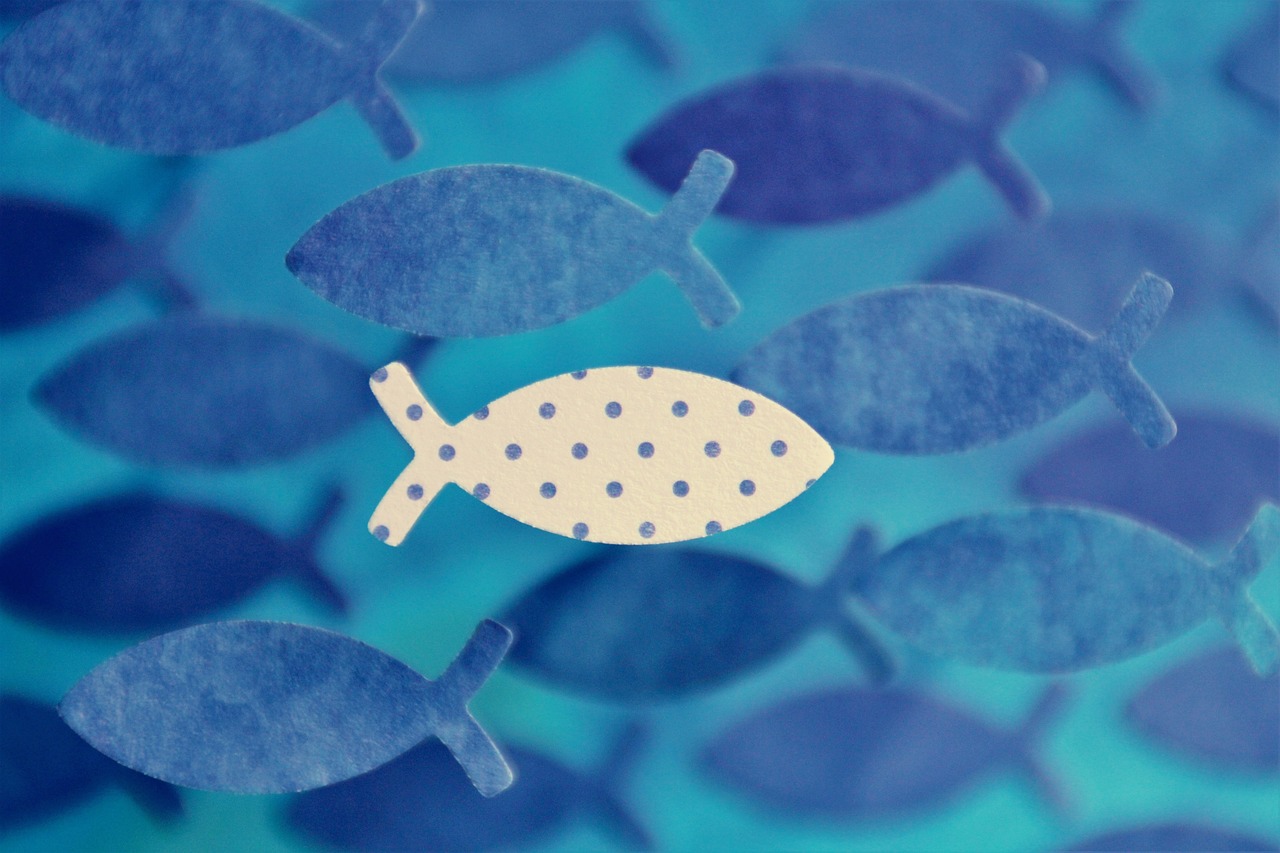
Self-awareness is a fascinating and crucial aspect of consciousness, especially as we navigate the waters of aging. It’s like the lens through which we view ourselves and our place in the world. Have you ever considered how your perception of yourself changes as the years go by? For many, self-awareness can deepen with age, leading to a richer understanding of one’s identity, values, and life experiences. However, this journey isn’t always smooth; it can be fraught with challenges that alter how we relate to ourselves and others.
As we age, our self-perception evolves, shaped by a multitude of factors including life experiences, societal expectations, and biological changes. This evolution can lead to a more profound sense of self, or it can create a disconnect between who we are and how we view ourselves. Think of it like a tree: as it grows, it branches out and expands, but sometimes it can become twisted or stunted due to external conditions. In the context of aging, this metaphor illustrates how our self-awareness can flourish or falter.
Research indicates that many older adults report a greater sense of self-acceptance and clarity about their life’s purpose. This heightened self-awareness can be attributed to several factors:
- Life Experiences: The accumulation of experiences often leads to a more nuanced understanding of oneself.
- Reflection: Older adults tend to spend more time reflecting on their past, which can enhance self-knowledge.
- Emotional Regulation: With age, many individuals develop better emotional regulation skills, allowing them to view their emotions and behaviors more objectively.
However, it’s important to note that not everyone experiences this positive shift in self-awareness. Some may struggle with feelings of loss, isolation, or regret, which can cloud their self-perception. The challenge lies in balancing these feelings while fostering a healthy sense of identity. This is where social connections play a pivotal role. Engaging with others can provide valuable feedback, helping individuals recalibrate their self-image and maintain a sense of belonging.
Moreover, self-awareness in older adults can influence mental health significantly. A strong sense of self can lead to improved emotional well-being and resilience against mental health issues like depression and anxiety. Conversely, a negative self-perception can exacerbate these conditions, leading to a cycle of decline. Therefore, cultivating self-awareness is not just beneficial; it’s essential for maintaining mental health as we age.
In summary, the role of self-awareness in aging is multifaceted and deeply impactful. It can enhance our understanding of ourselves, improve our mental health, and strengthen our connections with others. As we continue to explore the relationship between consciousness and aging, it’s vital to recognize the importance of nurturing self-awareness for a fulfilling life.
Q: How does self-awareness change with age?
A: Self-awareness often deepens with age, leading to greater self-acceptance and understanding, although some individuals may experience challenges in this area.
Q: What factors influence self-awareness in older adults?
A: Factors include life experiences, emotional regulation, and social connections, all of which play a significant role in shaping self-perception.
Q: Can improving self-awareness benefit mental health?
A: Yes, a strong sense of self can lead to better emotional well-being and resilience against mental health issues.

As we journey through life, our perception of the world around us undergoes significant transformations, particularly as we age. This evolution is not merely a matter of physical decline; it deeply influences how we interpret sensory information and interact with our environment. Aging can reshape our consciousness by altering our perceptions, leading to both challenges and adaptations that define our experiences in later years.
One of the most notable effects of aging on perception is the decline in sensory capabilities. For instance, many older adults experience changes in vision and hearing that can profoundly impact their daily lives. Imagine trying to enjoy a concert or a movie but struggling to hear the dialogue or see the subtleties of the visuals; this is a reality for many. These sensory changes can make it difficult to engage fully in social situations, potentially leading to feelings of isolation.
To illustrate the impact of aging on sensory perception, consider the following table that summarizes common sensory changes:
| Sensory Modality | Common Changes with Age | Potential Impacts |
|---|---|---|
| Vision | Reduced sharpness, increased glare sensitivity, color perception changes | Difficulties in reading, recognizing faces, and navigating environments |
| Hearing | Loss of high-frequency sounds, difficulty in background noise | Challenges in conversations, potential social withdrawal |
| Taste and Smell | Decreased sensitivity to flavors and odors | Reduced enjoyment of food, potential nutritional deficiencies |
These sensory declines can create a ripple effect, altering not only how we perceive the world but also how we relate to it. For instance, when an older adult struggles to hear a loved one’s voice, it can lead to frustration and misunderstandings, impacting relationships and emotional well-being. Furthermore, these changes can affect safety, as diminished sensory awareness may increase the risk of accidents.
However, it’s essential to recognize that the aging process does not solely bring about negative changes in perception. Many older adults develop enhanced skills in other areas, such as emotional perception and social awareness. With years of experience, they often become more adept at reading social cues and understanding emotional nuances, which can enrich their interactions with others. This shift can foster deeper connections and a greater appreciation for the subtleties of human relationships.
Additionally, the brain’s ability to adapt, known as neuroplasticity, plays a crucial role in how older adults process sensory information. Despite the physical decline in sensory organs, the brain can still reorganize itself and form new neural connections. This means that older adults can often compensate for sensory losses through alternative cognitive strategies, enhancing their overall perceptual experiences.
In conclusion, the impact of aging on perception is multifaceted, encompassing both declines and adaptations. While sensory changes can pose challenges, the development of emotional and social perception can lead to richer experiences in later life. Understanding these shifts is vital for fostering a supportive environment for older adults, helping them navigate the complexities of consciousness as they age.
- How does aging affect our senses? Aging can lead to reduced sharpness in vision, loss of hearing, and decreased sensitivity to taste and smell, which can impact daily life.
- Can older adults adapt to sensory changes? Yes, many older adults develop compensatory strategies and can enhance their emotional and social perception despite sensory declines.
- What role does neuroplasticity play in aging? Neuroplasticity allows the brain to adapt and reorganize itself, helping older adults maintain cognitive functions and improve perception despite physical changes.

As we journey through life, our bodies undergo a myriad of transformations, and our sensory systems are no exception. One of the most profound shifts occurs in our visual and auditory capabilities as we age. Imagine your eyes and ears as the windows and doors to the world around you; over time, these openings can become a bit foggy or creaky, affecting how we perceive our environment. Visual changes often manifest as a decrease in sharpness and clarity, leading to difficulties in distinguishing colors and contrasts. This can be particularly frustrating when trying to engage with everyday activities, such as reading a book or enjoying a vibrant sunset.
On the auditory front, age-related hearing loss is a common phenomenon that can leave individuals feeling isolated or disconnected. Sounds that once seemed crisp and clear may now appear muffled or distant. This auditory decline can affect not only the ability to enjoy music or conversations but can also lead to misunderstandings in social interactions. The interplay of visual and auditory changes can create a complex web of challenges, impacting overall consciousness and engagement with life.
To further illustrate these changes, consider the following table that outlines common visual and auditory changes experienced with aging:
| Type of Change | Visual Changes | Auditory Changes |
|---|---|---|
| Common Issues | Blurred vision, difficulty seeing in low light, increased sensitivity to glare | Tinnitus, difficulty hearing high-frequency sounds, challenges in understanding speech in noisy environments |
| Potential Causes | Cataracts, macular degeneration, glaucoma | Presbycusis (age-related hearing loss), damage to hair cells in the inner ear |
| Impact on Daily Life | Difficulty reading, navigating spaces, and recognizing faces | Social withdrawal, frustration in conversations, and reduced enjoyment of music |
These changes can lead to a cycle of decreased engagement and heightened frustration, as individuals may find themselves withdrawing from activities they once loved. The world can feel less vibrant when the colors fade and sounds dull. But it's essential to recognize that while these changes are common, they are not inevitable. There are steps we can take to mitigate these effects, such as regular eye and hearing check-ups, using assistive devices, and engaging in activities that stimulate our senses.
In summary, understanding the visual and auditory changes that accompany aging is crucial for maintaining our sense of consciousness and connection to the world. By acknowledging these shifts, we can better navigate the challenges they present and continue to thrive as we age.
- What are the most common visual changes associated with aging? Common visual changes include blurred vision, difficulty seeing in low light, and increased sensitivity to glare.
- How can I protect my hearing as I age? Regular hearing check-ups, avoiding loud environments, and using hearing aids when necessary can help protect your hearing.
- Are there treatments available for age-related visual and auditory changes? Yes, treatments such as glasses, contact lenses, and hearing aids can significantly improve the quality of life for those experiencing these changes.
- Can lifestyle changes help with sensory decline? Absolutely! Engaging in regular exercise, maintaining a healthy diet, and staying socially active can positively influence sensory health.
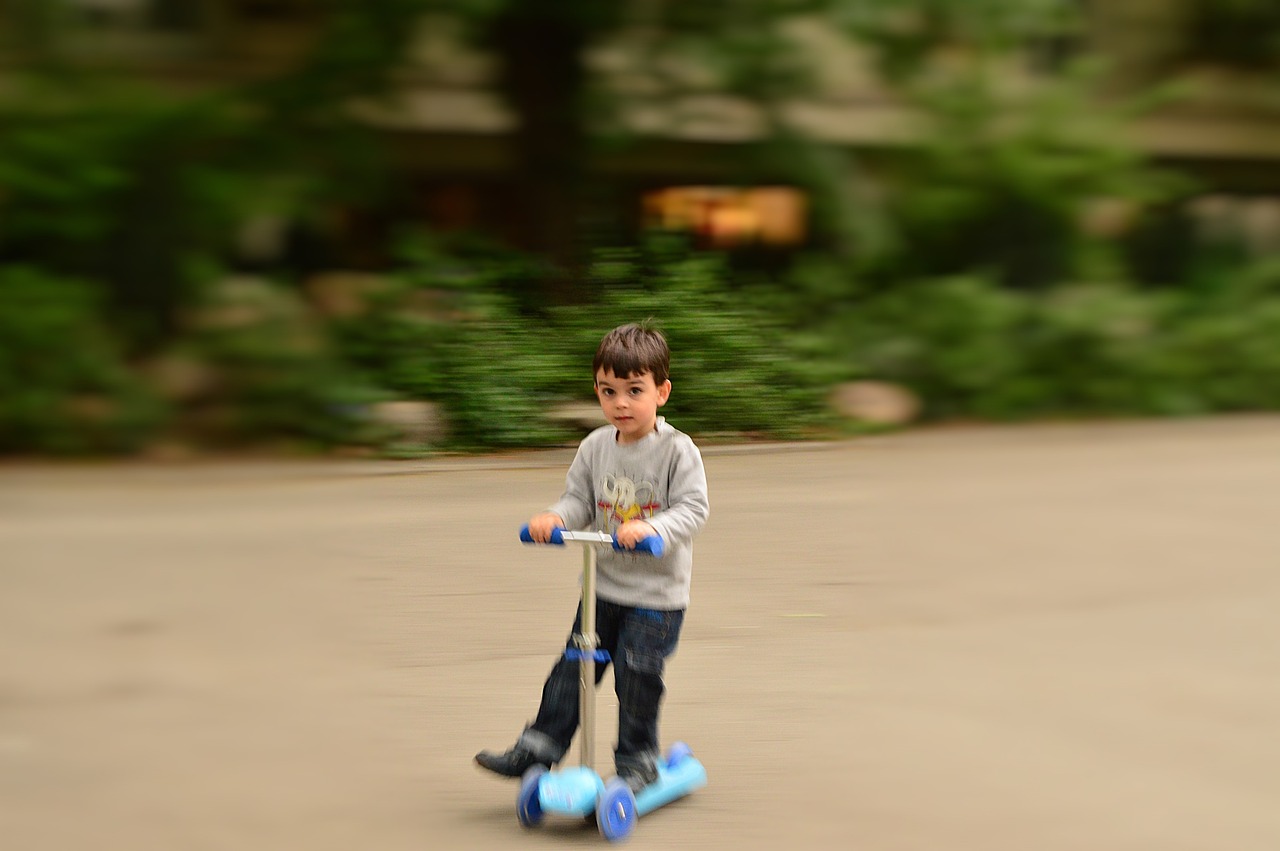
As we journey through life, our emotional and social perception evolves, significantly influenced by the passage of time. Aging brings with it a wealth of experiences that shape how we relate to others and interpret our surroundings. Imagine your mind as a finely-tuned instrument, where each new experience adds a note to the melody of your consciousness. However, as we age, some of those notes may start to sound a bit off-key.
One of the most fascinating aspects of aging is how it affects our interpersonal relationships. Older adults often report a shift in their social circles; they may prioritize deeper, more meaningful connections over casual acquaintances. This change can lead to a heightened sense of empathy and understanding, as life experiences allow for a richer emotional palette. However, it's essential to recognize that this shift can also bring feelings of loneliness and isolation, particularly if social networks dwindle.
Research indicates that aging can enhance emotional regulation, meaning older adults often handle their emotions better than younger individuals. They tend to focus on positive experiences and memories, creating a more optimistic outlook on life. This phenomenon is sometimes referred to as the “positivity effect.” It suggests that as we age, we become more selective about where we invest our emotional energy, often choosing to embrace joy and let go of negativity.
However, the decline in certain cognitive functions can complicate emotional and social perception. For instance, older adults may experience difficulties in recognizing social cues or interpreting the emotions of others accurately. This can lead to misunderstandings in social interactions, further complicating relationships. The interplay between cognitive decline and emotional awareness can be likened to a dance where the rhythm becomes less synchronized over time.
To illustrate these changes, consider the following table that highlights some key differences in emotional and social perception between younger and older adults:
| Aspect | Young Adults | Older Adults |
|---|---|---|
| Emotional Regulation | Often volatile; strong reactions | More stable; better at managing emotions |
| Social Connections | Wider network; many acquaintances | Fewer but deeper relationships |
| Empathy | Varies widely | Typically higher; more life experience |
| Focus on Positivity | Mixed; often problem-focused | More positive; often prioritize joy |
In conclusion, the evolution of emotional and social perception as we age is a complex interplay of cognitive changes, life experiences, and the innate human desire for connection. While some aspects may decline, others flourish, leading to a unique tapestry of relationships and emotional understanding. It's a reminder that aging, despite its challenges, can also bring profound insights and deeper connections with those around us.
- How does aging affect emotional intelligence?
Aging can enhance emotional intelligence as older adults often develop better emotional regulation and empathy through life experiences. - Why do older adults focus more on positive experiences?
This phenomenon, known as the "positivity effect," occurs because older adults tend to prioritize emotional well-being and meaningful experiences. - Can cognitive decline impact social relationships?
Yes, cognitive decline can lead to difficulties in interpreting social cues, which may strain interpersonal relationships. - What can older adults do to maintain social connections?
Engaging in community activities, joining clubs, or maintaining regular contact with family and friends can help preserve social connections.
Frequently Asked Questions
- How does aging affect cognitive functions?
Aging can lead to various cognitive challenges, such as memory loss, slower processing speeds, and diminished problem-solving abilities. These changes can significantly impact daily activities and overall quality of life.
- What factors contribute to cognitive decline in older adults?
Several factors influence cognitive decline, including genetics, lifestyle choices such as diet and exercise, and environmental influences like social engagement and mental stimulation. All these elements interplay with the aging process, affecting cognitive health.
- Can neuroplasticity help mitigate cognitive decline?
Yes! Neuroplasticity refers to the brain's ability to reorganize itself, which can help maintain cognitive functions. Engaging in activities that challenge the brain, such as puzzles or learning new skills, can promote neuroplasticity and enhance mental agility in older adults.
- What are some effective preventive measures for cognitive health?
To maintain cognitive health as you age, consider incorporating physical exercise, mental stimulation, and social engagement into your daily routine. These activities are crucial for preserving consciousness and improving overall well-being.
- How does self-awareness change with age?
Self-awareness can evolve over time, impacting how individuals perceive themselves and their place in the world. This shift can have significant implications for mental health and identity as people navigate the aging process.
- What sensory changes occur with aging?
As people age, they may experience declines in visual and auditory capabilities. These changes can affect how individuals interpret sensory information and engage with their environment, ultimately influencing their consciousness.
- How does aging impact emotional and social perception?
Aging can alter emotional and social perception, affecting interpersonal relationships and empathy. These shifts contribute to the overall experience of consciousness, as older adults may view and interact with the world differently.

